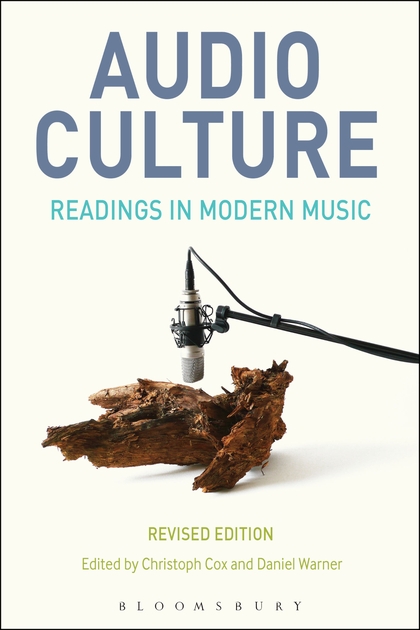Christoph Cox, Daniel Warner (eds.): Audio Culture: Readings in Modern Music (2004/2017)
Filed under book | Tags: · composing, composition, djs, electroacoustic music, electronic music, experimental music, improvised music, listening, minimal music, music, music criticism, music history, music theory, musique concrète, noise, silence, sound

“Audio Culture maps the aural and discursive terrain of vanguard music today. Rather than offering a history of contemporary music, the book traces the genealogy of current musical practices and theoretical concerns, drawing lines of connection between recent musical production and earlier moments of sonic experimentation. It aims to foreground the various rewirings of musical composition and performance that have taken place in the past few decades and to provide a critical and theoretical language for this new audio culture.
Via writings by philosophers, cultural theorists, and composers, Audio Culture explores the interconnections among such forms as minimalism, indeterminacy, musique concrète, free improvisation, experimental music, avant-rock, dub reggae, ambient music, hip hop, and techno. Instead of focusing on the putative “crossover” between “high art” and “popular culture,” Audio Culture takes all of these musics as experimental practices on par with, and linked to, one another.
Audio Culture includes writing by some of the most important musical thinkers of the past half-century, among them John Cage, Brian Eno, Glenn Gould, Umberto Eco, Ornette Coleman, Jacques Attali, Simon Reynolds, Pauline Oliveros, Paul D. Miller, David Toop, John Zorn, Karlheinz Stockhausen, and many others. The book is divided into nine thematically-organized sections, each with its own introduction.”
Publisher Continuum, September 2004
Second, revised edition, Bloomsbury, 2017
ISBN 9781501318351, 1501318357
xviii+646 pages
Reviews: Ian Whalley (Computer Music Journal, 2005), Christopher DeLaurenti (eContact!, 2006), Dene Grigar (Leonardo, 2005), Clemens Gresser (Tempo, 2005), Gregory Taylor (Cycling74, 2018).
PDF, PDF (updated on 2021-2-6)
EPUB, EPUB (updated on 2021-2-6)
Robert Fink: Repeating Ourselves: American Minimal Music As Cultural Practice (2005)
Filed under book | Tags: · minimal music, minimalism, music, music history, music theory

Where did musical minimalism come from—and what does it mean? In this significant revisionist account of minimalist music, Robert Fink connects repetitive music to the postwar evolution of an American mass consumer society. Abandoning the ingrained formalism of minimalist aesthetics, Repeating Ourselves considers the cultural significance of American repetitive music exemplified by composers such as Terry Riley, Steve Reich, and Philip Glass. Fink juxtaposes repetitive minimal music with 1970s disco; assesses it in relation to the selling structure of mass-media advertising campaigns; traces it back to the innovations in hi-fi technology that turned baroque concertos into ambient “easy listening”; and appraises its meditative kinship to the spiritual path of musical mastery offered by Japan’s Suzuki Method of Talent Education.
Publisher University of California Press, 2005
Roth Family Foundation: Music in America imprint
ISBN 0520245504, 9780520245501
280 pages
interview with the author (Molly Sheridan, NewMusicBox)
Comment (1)
